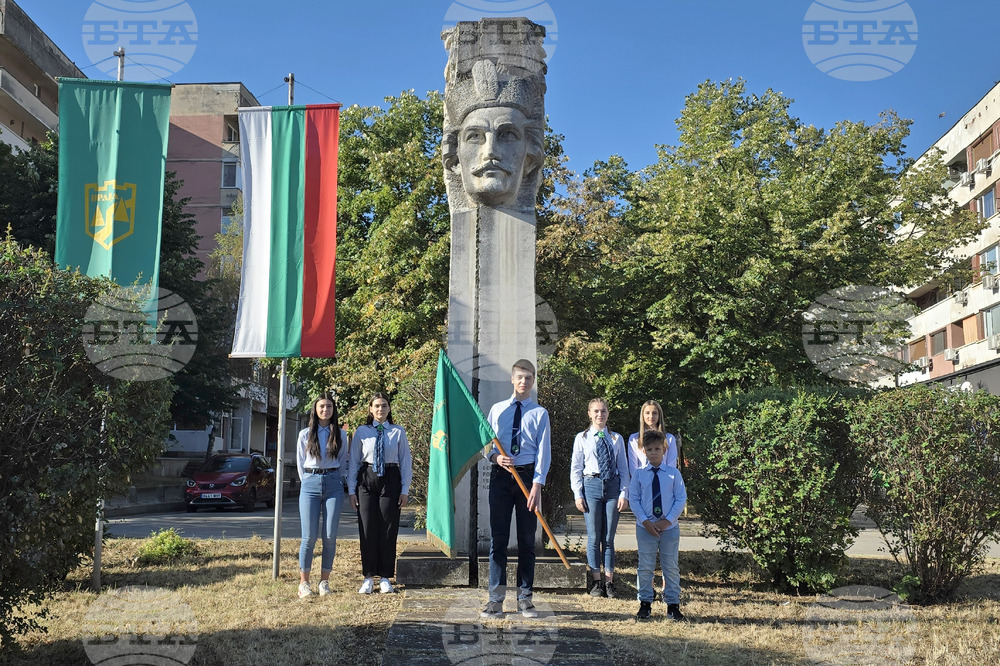site.btaVratsa Marks 158 Years Since Death of Revolutionary Nikola Voyvodov


A ceremony marking the 158th anniversary of revolutionary Nikola Voyvodov's death was held in front of his monument in Vratsa on Wednesday. The event was attended by Vratsa Mayor Kalin Kamenov, Vratsa Municipal Council Chair Vladimir Hristov, Nikola Voivodov High School Director Snezhanka Kamenova and students of the high school.
"We pay tribute and gratitude to his work. We bear his name with honor and dignity and we learn from his love of studying, as he knew five languages, as well as from his intellect and his heroism, as he was not afraid to stand against the great Ottoman Empire at the age of 25," Kamenova told BTA. She noted that a ten-minute film about Nikola Voyvodov was made by students and will be published on social media on Wednesday.
Eleventh-graders Kristiyan Tsvetanov and Stefani Dimitrova said that they succeeded in making Nikola Voyvodov speak and move in the film, which they accomplished with the help of AI. "It was a challenge to find data about Voyvodov. He is not like Hristo Botev and Vasil Levski, for example, about whom there are many facts. But we wanted to do it in order to present facts about our patron," they noted.
Nikola Hadzhikrastev Varbanov (1842-1867) is known today by his revolutionary nickname Nikola Voyvodov, Nelly Stoyanova, curator at the Vratsa Regional History Museum told BTA. He received a high education at the French Catholic Lyceum in Bebek, Constantinople and spoke English, French, Italian, Greek and Turkish, she pointed out, adding that he came into contact with the culture and ideas of Italy and stayed there for some time in order to learn the silk weaving craft. In Italy, Voyvodov connected with other bright minds of his era, embraced the cause of Bulgarian liberation and moved to Braila, Romania.
"In 1867, with his close friends, they decided to organize a detachment with which to cross Serbia into Bulgaria and to raise the people to fight together with other revolutionary leaders and comrades", Stoyanova recalled. She noted that it would be difficult to specify the composition of his detachment, but that most likely, many people from across the Balkans participated in it. A photo, which Voyvodov took with his friend Tsvyatko Pavlovich was bought by a Turkish spy and led to him being recognized in Ruse later, Stoyanova commented. "When the two friends were on their way to board the Austrian steamer Germania in August 1867 they met their demise in a shootout with the Turkish coastal police", she said.
"An interesting fact is that after their deaths, a political and diplomatic scandal arose that had no equivalent in the preceding or following few months and years", Stoyanova explained. She said that the death of Nikola Voyvodov and Tsvyatko Pavlovich led to turbulence in the diplomatic circles of three countries, namely Turkiye, Austria-Hungary and Serbia. The Austrian state as the owner of the ship, the Ottoman Empire and the Serbian principality, which claimed compensation for the murdered Serbian citizen, were involved in the scandal. The public and political response was great and led to the replacement of one foreign minister, one governor of a vilayet and one consul in the administrative centre of the vilayet, Stoyanova noted.
She said that Nikola Voyvodov was buried in Ruse, but his remains were moved to Vratsa in 1937 and have never been found since then. In the centre of Vratsa stands the house-museum of Nikola Voyvodov, which closed in June 2024, because there were not enough museum workers to maintain it.
/DT/
news.modal.header
news.modal.text